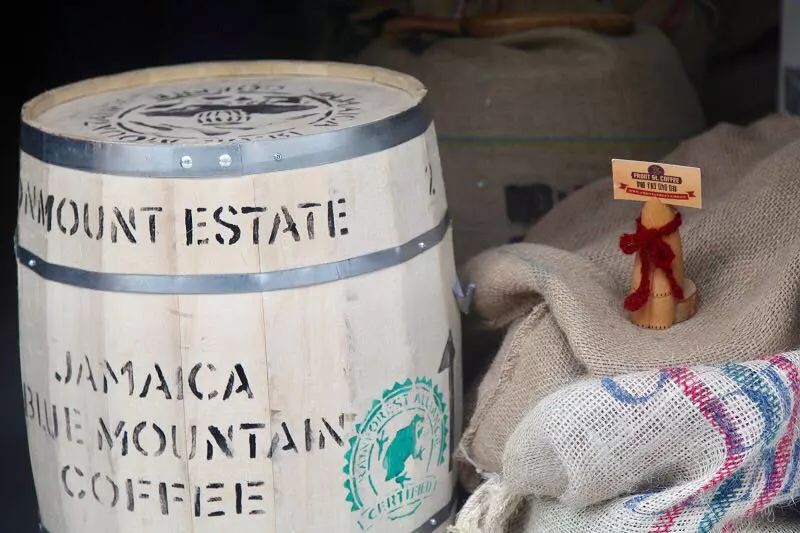What kind of coffee is African coffee? How does African coffee taste good? Characteristics of African coffee

Professional coffee knowledge exchange more coffee bean information please follow the coffee workshop (Wechat official account cafe_style)
The vast majority of coffee-producing countries are located in coffee belts, and there are now about 60 countries.
Africa, especially East Africa, produces some of the world's most unique coffee, characterized by vivid floral aromas, fruit and wine tones, and rich acidity. All in all, African coffee beans are full of flavor!
Ethiopia
Ethiopia and Kenya are not only the most unique sources of coffee in the world, but also one of the best in the world. Of all the coffee-producing countries, Ethiopia is probably the most eye-catching. Its charm stems not only from the unusual and surprising coffee it produces, but also from the mystery around it.
Ethiopia has always been regarded as the birthplace of coffee. When you understand the local way of handling coffee, you can probably understand that this imperial status is well-deserved. Even under the worst production conditions, coffee trees are blocked by other crops, the vast majority of farmers will still insist on not using agrochemicals. Only in some caffeine industries operated by the government in the southwest of the country, a small amount of agrochemicals may appear in wet-treated coffee. However, Harar (Harald) and Yirgacheffe (Yega Xuefei), known as "garden coffee", are still exceptions, because coffee is always produced in small quantities by individual farmers in the traditional way.
Ethiopia, a landlocked country located in the Horn of Africa, is the most populous landlocked country in the world. Ethiopia is regarded as the birthplace of coffee-Arabica species (Arabica). It has rich native varieties and a wide range of genetic sequences, many of which can not be found in other countries. Coffee in Ethiopia is mostly grown by small farmers on their own small farms or in wild and semi-wild environments, and nearly 15 million people across the country are involved in growing and processing coffee beans. As the birthplace of Arabica coffee varieties, coffee consumption dates back to the 10th century, when the first African nomads to eat coffee fruits (coffee cherries / coffee cherries) mixed coffee beans, oil and spices into refreshing and refreshing foods. Coffee farmers in Ethiopia mostly grow and harvest coffee by hand, in conjunction with the Coffee and Tea Development Department set up by the local government to improve and manage all coffee beans.
There are seven major producing areas in Ethiopia, the most famous of which are Jakashafi and Sidamo. Qianjie coffee is recommended to use 89-90 degrees to extract sun Yega and Sidamo, while water washing Yega can be extracted with 91-92 degrees water temperature.
Kenya
Kenya produces high-quality Arabica coffee, which is famous all over the world for its unique and delicate taste. The favorable climatic conditions on the highlands of Kenya make it easy for the country to produce the best quality coffee beans in the world.
Kenyan coffee is famous in Europe and the United States. Coffee beans produce distinct fruity acidity, combined with full-bodied and full-bodied aromas. Coffee is grown at the foot of the Kenyan mountains and is usually grown by small farmers. Kenyan producers emphasize quality, so processing and drying procedures are strictly controlled and monitored. Kenya has its own unique rating system. Kenya's AA is the largest legume in the 10-tier rating system, and AA + means it is grown on a manor.
Arabica in Kenya is planted on rich volcanic soil found in highlands between 1400 and 2000 meters above sea level. Altitude affects the taste, so it can be said that Kenyan coffee is not suitable for coffee that is bad for acidity.
Kenya offers the world's richest aromatic acidic coffee. The palate is complex and can have interesting fruit flavors, berry and citrus flavors, and some almost wines. Definitely Kenyan coffee can be divided into two main categories: large and bold, clean juicy or tropical and crispy. Compared with Ethiopian coffee, Kenyan coffee is brighter and more acidic. So Qianjie Coffee Club recommends higher water temperature extraction, 91-92 degrees water temperature, extraction time is about two minutes ten seconds to two minutes 20 seconds, with bright sour virgin fruit and sugar, honey sweet.
Only about 330 farms in Kenya are estates of 15 hectares or more. More than half of the coffee producers are small farmers, each with only a few hectares of land. Kenya grows Arabica coffee, especially SL28, SL34, French missionary bourbon and Ruiru.
Burundi
The Burundi coffee producing area of Burundi, located in Burundi in the interior of Africa, has the title of "Heart of Africa". It is mainly agricultural, of which coffee is the largest. Coffee industry here, it is no exaggeration to save the lives of most people and lives. Burundian coffee beans are mainly bourbon varieties, growing at a high altitude of 1700-2000m. Kayanza, Mutumba and Ngozi are their main coffee growing areas, mostly grown by small farmers and then sent to large washing plants. Qianjie coffee is recommended to be brewed at 89-91 degrees, with obvious Brin and citrus flavor.
Qianjie coffee: Guangzhou bakery, the store is small but a variety of beans, you can find a variety of unknown beans, but also provide online store services. Https://shop104210103.taobao.com
Important Notice :
前街咖啡 FrontStreet Coffee has moved to new addredd:
FrontStreet Coffee Address: 315,Donghua East Road,GuangZhou
Tel:020 38364473
- Prev

What's a good brand of African coffee? How do you drink African coffee? What are the famous coffee beans in Africa?
Professional coffee knowledge exchange more coffee bean information Please follow the coffee workshop (Wechat official account cafe_style) African coffee has been popular all over the world with its rich berry flavor and bright citric acid flavor. List of Top Ten Best Coffee Brands in Africa: 1) Tanzania Peaberry Coffee the best coffee brand in Africa and the rest of the world is the undisputed Tanzania
- Next

The new season Blue Mountain 50% discount, candlelight 50% discount! 29.9 yuan boutique hanging ear, 9.9 yuan Manning start the group! Time limit
Finally, I can meet you! The whole process of opening buckets in the blue mountains of Jamaica in the new season! Clifton Farm, Jamaica Jamaica Clifton Mount Estate Certification: tropical Rainforest Certification (the little green frog logo) treatment: washed variety: tin pickup flavor: caramel, 94 degrees pure chocolate, mint back to sweet Jamaica is the only government coffee in the world
Related
- What documents do you need to go through to open a coffee shop? coffee shop coffee shop certificate processing process
- How to purchase Coffee beans in small Cafe how to choose a suitable supplier for domestic Coffee supply Company
- How to drink Starbucks Fragrance White Coffee? how to make Australian White Coffee? what Italian coffee beans are recommended?
- The Story of Flora Coffee: the name of Flora Coffee Bean and the implication of the Flowers on Florna Coffee
- How much does a cup of coffee cost? How much is the profit of a cup of coffee? What is the profit of the coffee shop in a year?
- Yunnan small Coffee, known as "fragrant Coffee", introduces the characteristics of Alpine Arabica Coffee producing areas in Yunnan, China
- 2023 latest Starbucks full menu price list how much is a cup of Starbucks coffee what is better to drink the most popular hot and cold drinks recommended
- Starbucks different kinds of Coffee Price list Starbucks menu 2023 Top Ten Best drinks in Starbucks
- Starbucks Spring praise Comprehensive matching Coffee Bean theme Story Packaging implication and taste description
- The cost of a cup of coffee latte American coffee cost price and selling price

